For some, it’s an exotic and endlessly fascinating market, while others say it’s a lawless and sleazy freak show. Whichever way you look at it, sections of lower Sukhumvit are an amazing melting pot of different nationalities, cultures and entertainment possibilities – as well as all kinds of questionable business activities, reports Maxmilian Wechsler
| IN the congested 1.4-kilometer stretch of lower Sukhumvit Road between Soi 1 and Soi 23, you will come across the most bizarre collection of dubious characters and businesses in Thailand. Most of the vendors, shops, bars and restaurants are completely legitimate and serve as a unique attraction for locals and tourists alike. |
But here you will also find drug dealers and prostitutes soliciting on the footpaths; street vendors selling counterfeit watches, clothing, handbags and cosmetics; pirated DVDs, including porn; sex toys and a variety of erectile dysfunction drugs; weapons like knuckle dusters and electric stun guns along with realistic replicas of handguns.
You will also encounter beggars, some from other countries, stationed near BTS stops with rented children to pull at the heartstrings of passing tourists, as well as severely handicapped people hoping for a handout.
Then there are innumerable mobile bars that somehow get around the law and sell alcohol until dawn. And a gambling den in Soi 11 where motorcycle taxis play games of chance.
And if you’re unlucky enough, you may also see large rats crawling out of drains and scampering along the edges of footpaths.
Showtime for this daily theatre starts at 9am near Soi 5 with the arrival of local streetwalkers in search of an early morning trick. The vendors turn up around11am and leave before midnight to vacate the footpath for the second shift – the illegal mobile bars. This is a daily routine, apart from every Monday when workers from the Bangkok Metropolitan Administration (BMA) cleans the area.
You will also encounter beggars, some from other countries, stationed near BTS stops with rented children to pull at the heartstrings of passing tourists, as well as severely handicapped people hoping for a handout.
Then there are innumerable mobile bars that somehow get around the law and sell alcohol until dawn. And a gambling den in Soi 11 where motorcycle taxis play games of chance.
And if you’re unlucky enough, you may also see large rats crawling out of drains and scampering along the edges of footpaths.
Showtime for this daily theatre starts at 9am near Soi 5 with the arrival of local streetwalkers in search of an early morning trick. The vendors turn up around11am and leave before midnight to vacate the footpath for the second shift – the illegal mobile bars. This is a daily routine, apart from every Monday when workers from the Bangkok Metropolitan Administration (BMA) cleans the area.
| Dangerous assignment For several weeks, day and night, a BigChilli team monitored the area, speaking to vendors, bar owners and staff as well as foreign tourists and local residents. Almost without exception those interviewed described the situation on this stretch of road and side streets such as Soi 3, 4 and 11 as “an embarrassment” to Thailand. We witnessed numerous blatant violations of regulations, including the illegal parking of tuk-tuks, taxis, motorcycles, vending machines and other vehicles. These block one lane at a time when Sukhumvit is at its most congested. Traffic policemen who should clear the road seem more interested in stopping motorists who run red lights at the Soi 3 junction. Almost every day, uniformed BMA officers set up a mobile command center near the entrance to Soi 5 consisting of a large yellow umbrella with a table and two chairs and a sign in English, obviously directed at foreigners, warning against committing offences such as disposing of cigarette butts, littering, spitting and even cutting trees. Penalties can be as much as 2,000 baht. And yet these same officials ignored local prostitutes who hang around beside the temporary booths in order to approach foreigners. Sometimes the ladies chatted with the officers and sat on the seats at the command centre. All vendors we approached said they don’t approve of what the BMA officers are doing there. If these same officers extended their shift and patrolled the area after 4pm they might be surprised to see not only piles of discarded cigarette butts, but also lots of other garbage left close to their booth. Those responsible for this rubbish are mostly the vendors, who, to be fair, may be unaware their actions are illegal because the warning signs are written only in English and are removed when the BMA officers finish their shift. If the rules were applied equally, the vendors’ messy habits would generate more income for the BMA. Right now, only the rats benefit from the piles of garbage. People working on mobile bars and vendors selling supposedly prohibited items such as pirated DVDs, weapons and sex aids do not like to be photographed and can become very aggressive. In one incident, two men from a mobile bar in Soi 21 assaulted one of our female researchers while she was taking photos with a mobile phone. Luckily she wasn’t injured and the mobile wasn’t damage. |
| At night, as a precaution, we used mobile phones instead of proper cameras, which affected the quality of some photos. This stretch of Sukhumvit is popular with people from Africa. None liked having their photo taken by our team. But after hiding from the camera for a minute or two, they quickly returned to their normal routine. In contrast, people of Middle Eastern appearance seemed unconcerned by our photo-taking. Bars at night Mobile bars proliferate. In one night, from Soi 3 to Soi 23, we counted on both sides of the road some 60 such businesses, with about 235 tables and over 1,200 chairs and stools. In addition, we counted 37 bars operating from converted vehicles, mainly old vans, parked on the road inside Sois 7, 11 and 21, with 223 tables and over 1,000 chairs placed on the road or footpath. This stretch of Sukhumvit must also take the prize for the most sellers of sex aids and ED drugs in Bangkok. Some vendors advertised but did not display prescription medicines like Xiemed and Valium. We counted 43 such stalls of different sizes. |
Another 19 offered various weapons and replicas of firearms. A further nine stalls were selling pirated DVDs, with six displaying covers with indecent pictures. The number of mobile bars and stalls fluctuated from day to day, but not by much.
Transgender women – known as Kathoeys in Thai – are very much in evidence here, though it is sometimes difficult to distinguish them from born-females. Many just walk around or sit in bars waiting to pick up customers.
Prostitutes and transgender women who work this area come from at least 18 different countries, including African, Asian and Middle Eastern nations and the former states of the Soviet Union.
Anything goes
In the past few years, this section of Sukhumvit has been transformed from a shopping and entertainment area into a
zone where virtually anything goes, with the full knowledge of certain Thai authorities, according to a long-time vendor stationed near Soi 5.
As he talked to us, the man kept looking over his shoulder to make sure nobody else could hear the conversation. “I have been selling here for almost 18 years but I have never seen such corruption and disregard for the law as now,” he said. “There’s lots of money to be made, especially with some of the mobile bars.
“These days, many of the vendors are from Myanmar. Some can speak both Thai and fluent English, which gives them an advantage over Thai people.”
Another vendor near Soi 13 claimed that some foreigners are involved in selling drugs. To do so, the man continued, these dealers must have good ‘connections’ in Bangkok. He noted the sellers now dress better than in the past and use the latest mobile phones.
A narrow one-way lane off Soi 3 known as ‘Soi Africa’ has a number of hotels and clubs frequented by visitors from African nations.
“It’s obvious some of the sellers make a lot of money. Now they wear expensive clothes and accessories whereas before the same men were walking around in old jeans and sandals. They are always talking into mobile phones.
“If they get arrested, other dealers soon replace them.
“Really, I don’t like what’s going on around here, but I must keep quiet, otherwise I could lose my space on the footpath,” he continued. “The available space is disappearing anyway because the new hotels, shops and restaurants don’t allow us to sell in front when they open. And with all the construction going on or scheduled to start soon in the area, we might lose even more space. Some vendors have moved to the other side of Sukhumvit where fewer foreigners walk.”
Another vendor who has been on Sukhumvit more than 19 years and runs several stalls claims that certain state authorities “control” the commercial enterprises on the street, both legal and illegal. He gave some details, such as how much and to whom street vendors, illegal mobile bars and other prohibited businesses must pay.
Transgender women – known as Kathoeys in Thai – are very much in evidence here, though it is sometimes difficult to distinguish them from born-females. Many just walk around or sit in bars waiting to pick up customers.
Prostitutes and transgender women who work this area come from at least 18 different countries, including African, Asian and Middle Eastern nations and the former states of the Soviet Union.
Anything goes
In the past few years, this section of Sukhumvit has been transformed from a shopping and entertainment area into a
zone where virtually anything goes, with the full knowledge of certain Thai authorities, according to a long-time vendor stationed near Soi 5.
As he talked to us, the man kept looking over his shoulder to make sure nobody else could hear the conversation. “I have been selling here for almost 18 years but I have never seen such corruption and disregard for the law as now,” he said. “There’s lots of money to be made, especially with some of the mobile bars.
“These days, many of the vendors are from Myanmar. Some can speak both Thai and fluent English, which gives them an advantage over Thai people.”
Another vendor near Soi 13 claimed that some foreigners are involved in selling drugs. To do so, the man continued, these dealers must have good ‘connections’ in Bangkok. He noted the sellers now dress better than in the past and use the latest mobile phones.
A narrow one-way lane off Soi 3 known as ‘Soi Africa’ has a number of hotels and clubs frequented by visitors from African nations.
“It’s obvious some of the sellers make a lot of money. Now they wear expensive clothes and accessories whereas before the same men were walking around in old jeans and sandals. They are always talking into mobile phones.
“If they get arrested, other dealers soon replace them.
“Really, I don’t like what’s going on around here, but I must keep quiet, otherwise I could lose my space on the footpath,” he continued. “The available space is disappearing anyway because the new hotels, shops and restaurants don’t allow us to sell in front when they open. And with all the construction going on or scheduled to start soon in the area, we might lose even more space. Some vendors have moved to the other side of Sukhumvit where fewer foreigners walk.”
Another vendor who has been on Sukhumvit more than 19 years and runs several stalls claims that certain state authorities “control” the commercial enterprises on the street, both legal and illegal. He gave some details, such as how much and to whom street vendors, illegal mobile bars and other prohibited businesses must pay.
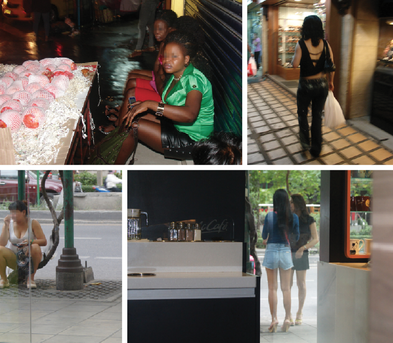 Streetwalkers of many nationalities ply their trade on Sukhumvit.
Streetwalkers of many nationalities ply their trade on Sukhumvit. Paying to avoid trouble
“We pay to various ‘entities’ so they will overlook violations like keeping metal vending carts on the road or selling alcohol all night,” the vendor told us.
He also claimed that these same organizations have an agreement on whom controls what in order to avoid conflicts and prevent the vendors from interfering in another’s business or territory.
Another practice reportedly taking place on lower Sukhumvit is that “owners” of a space on the footpath rented from the authorities sometimes sub-let them to another person.
While talking to one female vendor selling clothes near Soi 3, we asked if the authorities were looking after her. She replied with a serious expression: “No, we are looking after them.”
She and other vendors also alleged that a small group of Africans sell drugs, get drunk every night and often fight each other, mainly around Soi Africa. We were shown to a bar near Soi 5 which displays a large sign in English saying that Africans won’t be served due to “unacceptable behavior!”
Tax-free sidewalk bars
When vendors begin to vacate their spaces early or mid-evening,
they are almost immediately replaced by dozens of small mobile bars.
The background to this phenomenon was explained by the owner of a permanent bar. “They first appeared on Sukhumvit after a change in closing hours laws by then Interior Minister Purachai Piumsombun in 2001.
“This meant legitimate bars had to close earlier, so owners lost a lot of money. Foreign visitors began to look elsewhere for places to drink and to meet girls. This led directly to the mobile bars that now occupy the footpaths.”
The law stipulates that entertainment venues must stop selling alcohol at 1am, though some continue until much later, presumably through “arrangements” with the authorities. Nonetheless, legitimate businesses are still required to comply with other state regulations that the mobile bars ignore.
“We pay to various ‘entities’ so they will overlook violations like keeping metal vending carts on the road or selling alcohol all night,” the vendor told us.
He also claimed that these same organizations have an agreement on whom controls what in order to avoid conflicts and prevent the vendors from interfering in another’s business or territory.
Another practice reportedly taking place on lower Sukhumvit is that “owners” of a space on the footpath rented from the authorities sometimes sub-let them to another person.
While talking to one female vendor selling clothes near Soi 3, we asked if the authorities were looking after her. She replied with a serious expression: “No, we are looking after them.”
She and other vendors also alleged that a small group of Africans sell drugs, get drunk every night and often fight each other, mainly around Soi Africa. We were shown to a bar near Soi 5 which displays a large sign in English saying that Africans won’t be served due to “unacceptable behavior!”
Tax-free sidewalk bars
When vendors begin to vacate their spaces early or mid-evening,
they are almost immediately replaced by dozens of small mobile bars.
The background to this phenomenon was explained by the owner of a permanent bar. “They first appeared on Sukhumvit after a change in closing hours laws by then Interior Minister Purachai Piumsombun in 2001.
“This meant legitimate bars had to close earlier, so owners lost a lot of money. Foreign visitors began to look elsewhere for places to drink and to meet girls. This led directly to the mobile bars that now occupy the footpaths.”
The law stipulates that entertainment venues must stop selling alcohol at 1am, though some continue until much later, presumably through “arrangements” with the authorities. Nonetheless, legitimate businesses are still required to comply with other state regulations that the mobile bars ignore.
“We need to have various licenses, face regular checks by the police, pay taxes, pay regular salaries and send employees for medical check-ups. We also don’t allow under-age people,” continued the bar owner.
“We conduct ourselves according to the laws, but we’re losing money because unlicensed bars on the streets don’t pay taxes or salaries to employees. They only pay bribes to stay open and sell alcohol until early morning. This is their only overhead. It’s not fair to law-abiding bar and restaurant owners.
“These mobile bars are taking our business by selling alcohol all night and also undercut our prices. They can sell drinks cheaper because their expenses are much less,” the man said.
He claimed that the mobile bar business is “well organized,” with the equipment, tables and chairs being stored in many places along Sukhumvit during the daytime.
“The bars are decorated with colourful lights and have speakers blaring music. Bottles of alcohol are openly displayed. They don’t have toilets, so some customers will relieve themselves on the street or go into a local hotel.”
In fact, a public toilet recently opened in a building near Soi 5. Costing five baht a visit, it apparently closes at 1 am.
A waiter who has worked at a well-known nightspot almost since its opening 42 years ago said: “Before 2001, we could be open and sell alcohol until 6am. Everything was fine. We were making money and customers were happy. But then the government started to impose regulations and orders. We had to close for a short time at midnight, so everyone moved to the street and that’s when the problems started.”
The man added that his establishment closes at 2am. The police go there regularly to check that it stops serving at that time.
According to a transgender woman who serves drinks at a mobile bar near Soi 7, she and some of the other girls don’t receive salaries but get 50% of the price of drinks. She said this is her main source of income, though she admits she might also accept money to accompany a customer to his hotel.
Opening hours of mobile bars seem to be getting earlier. One sets up outside the Nana post office around 9pm, while others in Soi 11 start around 9.30pm. Most of these on the main road get going after 11pm. The bars enjoy a brisk business with customers often drinking till 3am or later. The sight of so many foreigners of many different nationalities chatting to the freelance prostitutes is just part of Sukhumvit’s outlandish character.
“We conduct ourselves according to the laws, but we’re losing money because unlicensed bars on the streets don’t pay taxes or salaries to employees. They only pay bribes to stay open and sell alcohol until early morning. This is their only overhead. It’s not fair to law-abiding bar and restaurant owners.
“These mobile bars are taking our business by selling alcohol all night and also undercut our prices. They can sell drinks cheaper because their expenses are much less,” the man said.
He claimed that the mobile bar business is “well organized,” with the equipment, tables and chairs being stored in many places along Sukhumvit during the daytime.
“The bars are decorated with colourful lights and have speakers blaring music. Bottles of alcohol are openly displayed. They don’t have toilets, so some customers will relieve themselves on the street or go into a local hotel.”
In fact, a public toilet recently opened in a building near Soi 5. Costing five baht a visit, it apparently closes at 1 am.
A waiter who has worked at a well-known nightspot almost since its opening 42 years ago said: “Before 2001, we could be open and sell alcohol until 6am. Everything was fine. We were making money and customers were happy. But then the government started to impose regulations and orders. We had to close for a short time at midnight, so everyone moved to the street and that’s when the problems started.”
The man added that his establishment closes at 2am. The police go there regularly to check that it stops serving at that time.
According to a transgender woman who serves drinks at a mobile bar near Soi 7, she and some of the other girls don’t receive salaries but get 50% of the price of drinks. She said this is her main source of income, though she admits she might also accept money to accompany a customer to his hotel.
Opening hours of mobile bars seem to be getting earlier. One sets up outside the Nana post office around 9pm, while others in Soi 11 start around 9.30pm. Most of these on the main road get going after 11pm. The bars enjoy a brisk business with customers often drinking till 3am or later. The sight of so many foreigners of many different nationalities chatting to the freelance prostitutes is just part of Sukhumvit’s outlandish character.
| Prostitutes on visas The area is also known for its foreign prostitutes. These start their shift late at night, joining local women in the search for customers at coffee shops, restaurants, discos and other entertainment venues. Some of the taxi drivers who park in Soi 3 have agreements with the staff of several Bangkok hotels who call when a guest wants a girl. The driver and the hotel staff receive at least 500 baht each in commission. We witnessed how it works in practice: After receiving a call, the driver entered the hotel coffee shop and a short time later walked out with two foreigners and drove them to the customer. The women returned in another taxi two hours later and entered the coffee shop to wait for another assignment. It is believed that some of these foreign prostitutes have been living in Thailand for years. To extend or get a new tourist visa is allegedly not a problem. A fee of around 6,000 baht is paid to certain tour agencies which organize “visa runs” to neighboring countries. If it involves just a U-turn at a border checkpoint, the cost is 2,000 baht. One foreign woman who has been using this service for years said that she travels in a minivan to a neighboring country where they give their passports to a Thai man upon arrival at a hotel. The man gives the passport back the next day with a new stamp. Such “visa runs” could end with the new regulation concerning re-entries to Thailand announced by the Thai Immigration Bureau on May 8. |
Tourists shocked
Foreigners holidaying in Thailand with their families are invariably shocked when walking along lower Sukhumvit Road, especially after dark. Some cover their children’s faces while passing DVD stalls where porn is on display. Such products were hidden in the past. The number of stalls displaying sex aids has increased during past years
“Many of the foreign men who buy sex aids are from the Middle East, where these items are banned,” said one vendor from Myanmar.
Several foreign diplomats who live or work in this area told The BigChilli they had been approached by African men with the offer of illicit drugs. They expressed surprise that this sort of activity was going on relatively out in the open.
In contrast, Thais who live and work in the area are almost never approached about drugs or sex.
It is clear that considerable “inside” work and corruption takes place for this daily drama to unfold on Sukhumvit. Should we be surprised? Probably not, for as Privy Counselor His Excellency Kasem Watthanachai is reported as saying during a seminar organized by the Office of Ombudsman in Bangkok on April 26, corruption is a serious problem that needs to be addressed urgently.
Poll figures showing that about 80% of Thais admitted they have been involved in corruption were alarming, added Mr Kasem. He also said the situation in Thailand over the past decade is unprecedented, describing it as a “decade of darkness” resulting from politics revolving around populist policies which have led people to crave and become addicted to materialism and consumerism.
Post-coup postscript
THE imposition of the curfew hasn’t greatly affected the vendors, including those selling illegal items.
They open their stalls earlier to make up the lost hours. Prostitutes who normally assemble on the footpath near Soi 5 early in the morning are out in record numbers in the evening, and this applies to other parts of Sukhumvit Road. Foreign drug dealers also seem to be trading as normal. The big losers are the mobile bars, who will no doubt be out in full force after the curfew
is lifted, probably with redecorated rigs.
If the reforms promised by the new regime eventually reach lower Sukhumvit, the authorities may take a tougher line on law-breakers, so that honest, hardworking business people can make a living here.
Foreigners holidaying in Thailand with their families are invariably shocked when walking along lower Sukhumvit Road, especially after dark. Some cover their children’s faces while passing DVD stalls where porn is on display. Such products were hidden in the past. The number of stalls displaying sex aids has increased during past years
“Many of the foreign men who buy sex aids are from the Middle East, where these items are banned,” said one vendor from Myanmar.
Several foreign diplomats who live or work in this area told The BigChilli they had been approached by African men with the offer of illicit drugs. They expressed surprise that this sort of activity was going on relatively out in the open.
In contrast, Thais who live and work in the area are almost never approached about drugs or sex.
It is clear that considerable “inside” work and corruption takes place for this daily drama to unfold on Sukhumvit. Should we be surprised? Probably not, for as Privy Counselor His Excellency Kasem Watthanachai is reported as saying during a seminar organized by the Office of Ombudsman in Bangkok on April 26, corruption is a serious problem that needs to be addressed urgently.
Poll figures showing that about 80% of Thais admitted they have been involved in corruption were alarming, added Mr Kasem. He also said the situation in Thailand over the past decade is unprecedented, describing it as a “decade of darkness” resulting from politics revolving around populist policies which have led people to crave and become addicted to materialism and consumerism.
Post-coup postscript
THE imposition of the curfew hasn’t greatly affected the vendors, including those selling illegal items.
They open their stalls earlier to make up the lost hours. Prostitutes who normally assemble on the footpath near Soi 5 early in the morning are out in record numbers in the evening, and this applies to other parts of Sukhumvit Road. Foreign drug dealers also seem to be trading as normal. The big losers are the mobile bars, who will no doubt be out in full force after the curfew
is lifted, probably with redecorated rigs.
If the reforms promised by the new regime eventually reach lower Sukhumvit, the authorities may take a tougher line on law-breakers, so that honest, hardworking business people can make a living here.


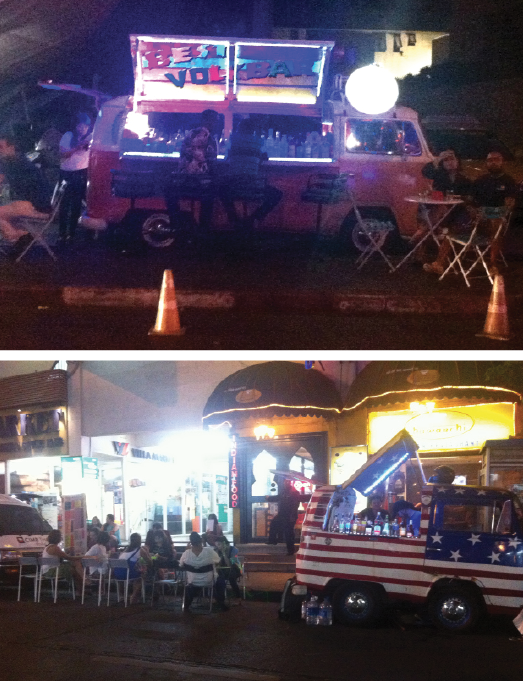
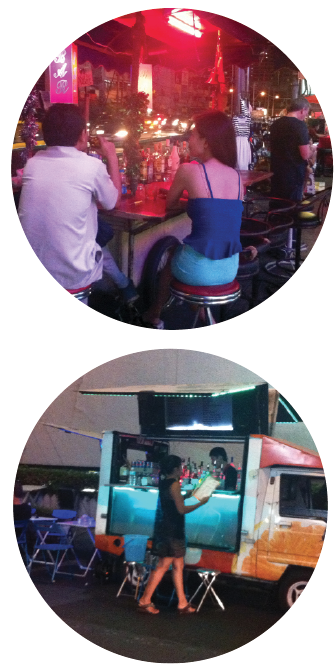
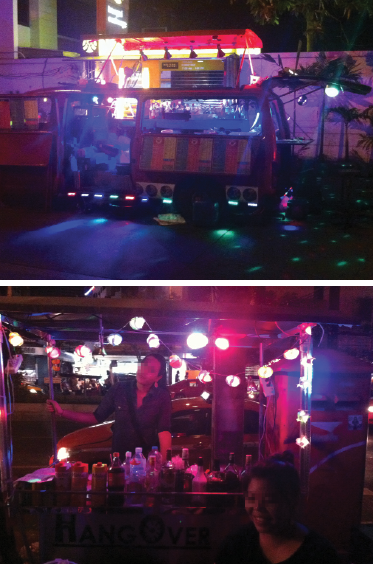
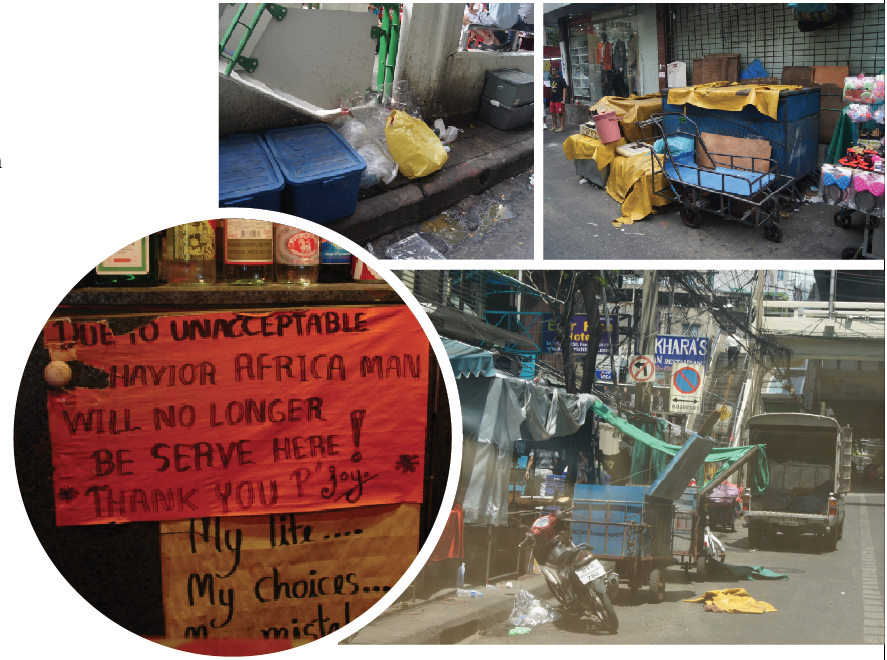
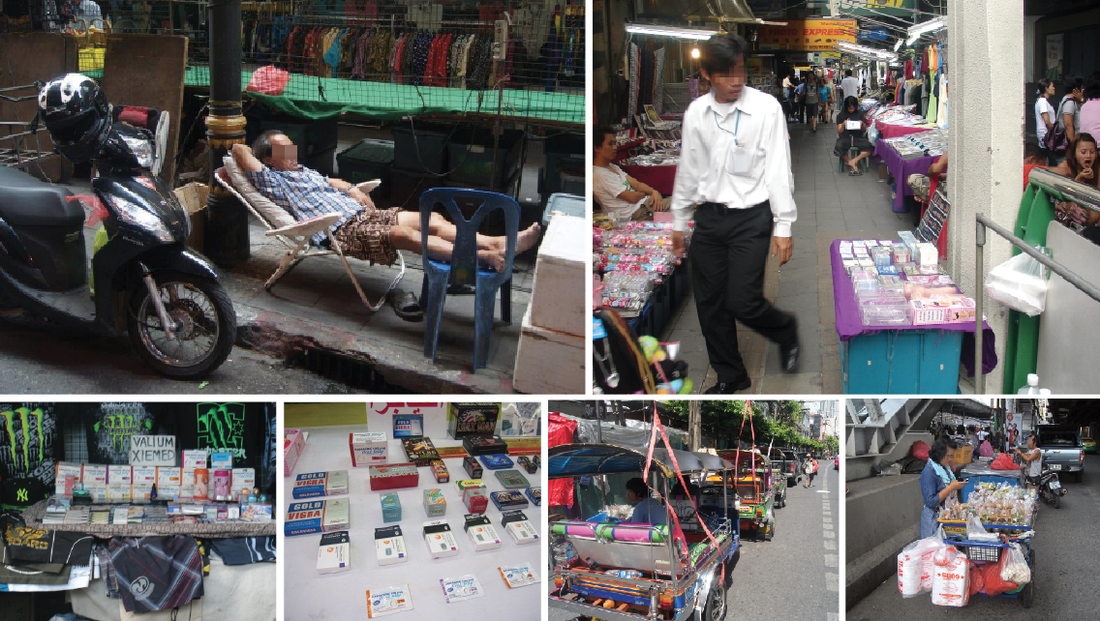
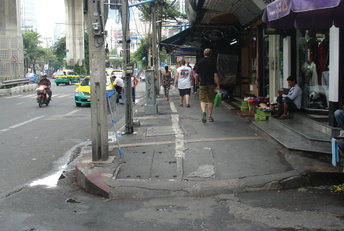
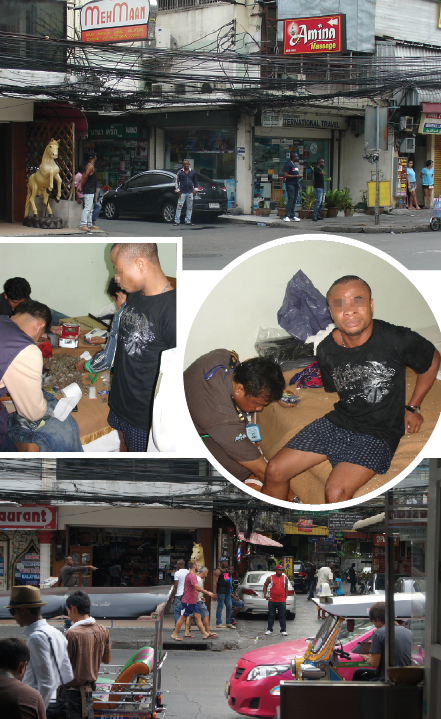
 RSS Feed
RSS Feed
















